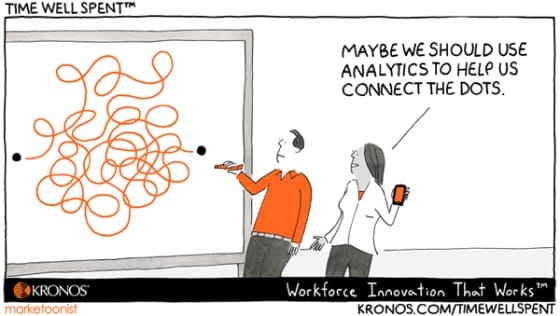Logic Is Not Always Linear – Friday Distraction
(Editor’s Note: Today’s post is brought to you by our friends at Kronos, a leading provider of workforce management and human capital management cloud solutions. The company was named of the 2017 Best Workplaces for Giving Back by Fortune Magazine. Congrats to the Kronos team! Enjoy the post.)
I like to think of myself as a logical person. One of the definitions of logical is “(of an action, development, decision, etc.) natural or sensible given the circumstances.” Notice it didn’t include linear. Something can be logical and not necessarily linear.
An example is PowerPoint versus Prezi. Both provide users with the ability to create digital presentations. PowerPoint does it in a linear fashion. Prezi in a non-linear one. But that doesn’t mean a presentation created on Prezi isn’t logical.
I was reminded of the importance of logic when I saw today’s Time Well Spent from our friends at Kronos. Going from Point A to Point B isn’t always linear.
When organizations are trying to connect the dots, they have several tools at their disposal.
People. Sometimes we need to step away from challenges to see the logic or the connection. Sometimes we need co-workers to help us see the pattern or a different way of thinking. Each of us must be willing to say, “I don’t see it.” Or “Help me see it.” It takes self-awareness and trusting relationships with the rest of the team.
Technology. This is one of those moments where technology can be our best friend. Technology is about logic. Organizations need to be willing to use technology to help them see trends and themes. However, I would add that technology needs people to recognize the need for tech and to use it effectively. Great technology used badly isn’t going to provide accuracy and efficiency.
Data. Speaking of accuracy and efficiency, for technology to play its role, it needs good data. We’ve all heard that old phrase “garbage in, garbage out”. It applies here too. People need to know good data when they see it. Otherwise, they could make decisions based on false assumptions. And that’s not logical.
Organizations should use their people, technology, and data to make sensible decisions. Logical decisions. Because logical decisions are easy to explain and understand. When everyone is on the same page, and working toward the same goal, the company is able to accomplish its strategy.
0